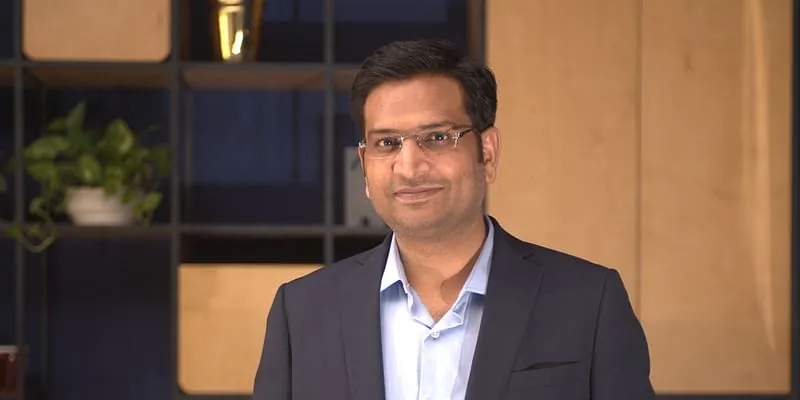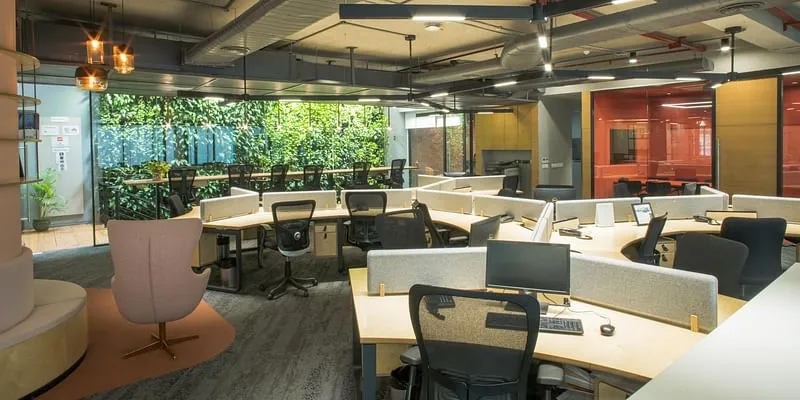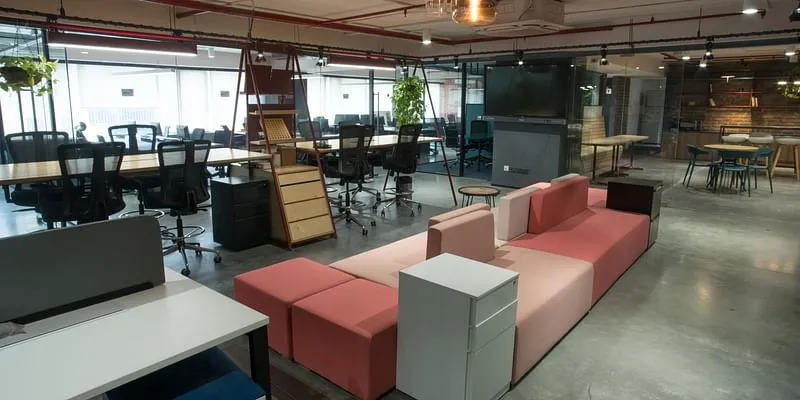How a small-town boy with Rs 12k built a Rs 200 Cr turnover business, landed Amazon, Google, Adidas, PepsiCo as clients
Tushar Mittal started his interiors business Studiokon Ventures (SKV) in Gurugram in 2009 with minimal investment. Over the next 11 years, he built SKV into a Rs 200 crore turnover company with over 250 employees despite taking no external funding.

Tushar Mittal, Founder and CEO, Studiokon Ventures
Born in 1982 in the small town of Rudawal, Rajasthan, Tushar Mittal studied at a local village school. His parents, who ran a kirana store that sold groceries, were in debt. They had taken loans from local lenders and relatives, and were under pressure to return them.
For a young Tushar, his choices were limited. He could either join his family business or pursue his dream of higher studies. At first, due to his family’s financial condition, he chose to work at the kirana store.
“I continued to harbour dreams of studying further. Once, I met a relative at a wedding, and he encouraged me to study further. I realised I was not ready to compromise on my dreams forever. The next day, I made a difficult choice and left for Kota to study engineering,” Tushar tells SMBStory.
With Rs 22,000 in his pocket and a part-time gig at an architectural firm, 17-year-old Tushar funded his own education. His time at the architectural company helped him gain experience in the interiors business – a field he would later venture into when he started his own company.
Tushar also became the first person from his village to receive an educational loan from Punjab National Bank, despite having nothing to offer as collateral.
“Getting the loan sanctioned in 2001 was a tough task, especially because I had nothing to offer as collateral. But I persisted with the zonal manager and he helped me navigate the maze of red tape,” he says.
Taking the entrepreneurial leap
Tushar was able to complete his PGDM in Construction Management from NICMAR and BE (Civil), and then he landed a job at DLF. In the following year, he left to work with an independent contractor before establishing (SKV) in Gurugram in 2009.
Tushar started SKV with just Rs 12,000 that he saved during his short stint at DLF. He took no external funding over the next 11 years, and built SKV into a Rs 200 crore turnover company with over 250 employees.
“We have had no investors and no external funding. We have backed ourselves every step of the way. Today, we have built turnkey interior solutions for over 200 offices for clients such as Amazon, Google, ZS, British Council, Adidas, PepsiCo, NTT, DLF, Tractebel, etc,” he says.

Inside the SKV office
Initial roadblocks
In the unorganised and unstructured construction and interior design industry, Tushar found it difficult to build a capable, trustworthy and dedicated team.
“Right from the bottom to the top of the pyramid, it was challenging to find skilled workers with expertise in the various verticals of the industry. To solve this, we started skilling our own teams as per trade requirements and setting up our manufacturing facility. This helped us create a team with dedicated responsibilities,” he says.
SKV’s 80,000 square feet factory in Manesar allows it to produce good quality fit-outs and products off-site from its interiors projects. Tushar believes the quality of the fit-outs is compromised when they are made on-site.
“By manufacturing them at a remote location, SKV is handed a competitive edge as it can facilitate timely delivery of quality interiors and also offer more competitive costs,” he explains
After launching SKV, Tushar landed a contract with Emerson – his first Fortune 500 client. “Emerson was happy with our services and continued to engage with us. This was the gateway for us working with several other Fortune 500 companies,” he says.
In 2012, SKV faced a scenario where it had numerous orders but no funding to execute them as the business was still slowly scaling up. For Tushar, it was a gruelling period of managing cash flows carefully and ensuring he didn’t lose the trust of his clients. At the same time, he didn’t want to compromise on keeping his workers and service providers happy.
“In this difficult period, our partners, vendors and suppliers were understanding as we worked to tide over this difficult time. We had worked with them efficiently, responsibly, and with transparency, and this had helped develop a good rapport and working relationship with them. This is what came through for us and helped us walk the tightrope of project delivery and a cash crunch. It also went a long way in establishing our credibility,” he says.
Being prepared for challenges
In 2017, SKV faced a similar situation where it had many large customers and several colossal projects to deliver. Many clients were implementing longer and staggered payment cycles, and at the same time, SKV was scaling up as well.
“We had a lot of finances to balance, but found ourselves much better off than five years ago. We received more cooperation from every end owing to our established track record,” he says.
Over the years, SKV has faced competition from foreign as well as several Indian companies. To stay ahead of them, it has invested heavily in resources and infrastructure to offer its clients a range of services and experiences.
“We built a vastly-experienced design and service team and also put together state-of-the-art design studios. Not many other companies offer these services as of now. We had to constantly stay on our toes by researching upcoming trends and technologies and capitalising on them,” Tushar says.

Another look at the SKV office
Diversification and the way forward
Tushar believes the industry features no set platforms, norms, or processes. Thus, his team had to develop tech systems and exclusive technologies to streamline business processes and provide clients with better experiences.
SKV started as an interior design and service provider, and it diversified to develop its own furniture category and range.
“We will soon be launching our own range of furniture which will be minimalistic, aesthetic, and of exceptional quality,” Tushar says.
With a growing standard of living among millennials and an increasing demand for well-designed workspaces, SKV seeks to emerge as a technology-driven construction giant in the interiors space. Tushar believes “few companies have capitalised on the market for tech-enabled construction and delivery services.”
However, with the ongoing COVID-19 crisis, it certainly won’t be an easy task. With SKV’s cash flows affected, and more labour required to combat the skilling gap, its projects have been adversely impacted.
“Selling of office-fit outs is largely dependent on demand from companies which have to be doing well. While cost pressures have certainly risen for us, we are working on strategies to overcome these issues, and making the best of this time by understanding what will come next and gearing up for it. We are trying to develop asset-like models, and with more acceptance of technology in the post-pandemic era, we are excited to see the opportunities it will bring,” Tushar says.
Edited by Kanishk Singh









